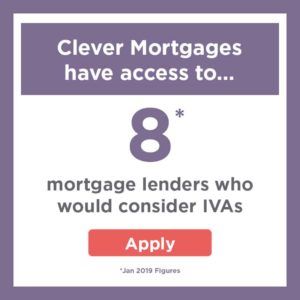Mortgage after an IVA
In this article, we discuss getting a mortgage after an IVA, how to get a mortgage after an IVA and the best way to achieve this and aspects of an IVA.


ADVERSE BROKER WINNER
See if you pre-qualify for a mortgage
Enquire about a mortgage with our pre-qualifying affordability form. No imprint on your credit score.
Will not affect credit score
Getting a mortgage after an IVA (Individual Voluntary Arrangement) has finished may seem difficult, but is certainly possible. Although an IVA will remain on your credit report for 6 years; that’s not to say that you won’t be able to get a mortgage in this time. Some lenders will review an application the day after your IVA has ended.
Speak to us today about your situation and we can advise on the right path for getting a Mortgage after an IVA.
It’s probably fairly obvious that getting a mortgage after an IVA will be more difficult than with a clean credit report. What isn’t so obvious; however, are the steps you can take to give yourself the best chance of being approved. Here are some of the ways you can do to get a mortgage once you’ve been in an IVA:
How to get a mortgage after an IVA
Knowing about what an IVA is and whether you can get a mortgage after one, you may be wondering how to go about getting a mortgage after an IVA. Here’s a general guideline of what you should look at to apply for a mortgage after an IVA.
Contact a specialist mortgage broker
Lenders will still want you to disclose a previous IVA when you apply for a mortgage, going to a specialist broker can help you find out which lenders are likely to accept you, and give you a scope of the rates and products available after an IVA. It’s important to go to a specialist broker if you choose to go to one, as it’s likely you’ll need a specialist lender, not a usual high-street lender. At Clever Mortgages we have access to 8 specialist mortgage lenders that consider applicants with IVAs, so it’s worth enquiring.
If you’d like some help finding the right mortgage for you after an IVA, get in touch with one out our specialist advisors!
Find a mortgage
Once you’ve found a property you’d like to purchase, found a lender that will approve you and make a successful offer on the property, you should be able to make a formal mortgage application as usual. See our guide to applying for a mortgage.
Mortgage application process
4 simple steps for applying for a mortgage. See more about the mortgage application process here
Complete our
pre-qualify form
Let us know a few details about the mortgage you require
A mortgage specialist will call
One of our brokers will call and get a few more details of your requirements
We search for your perfect mortgage
We will search the market for the best rates for your circumstances
A Decision in Principle is made
We will secure a DIP with a lender, if you approve we move forward with a full application.
A few things that can speed up the process beforehand
Request a competition certificate
First of all, you should request a certificate of completion from your insolvency practitioner as soon as you finish your IVA. This can be used to prove to lenders that you’ve completed your IVA successfully and made all your repayments.
Save up your deposit
Generally, the chances of being accepted for a mortgage increase with a larger deposit. After finishing an IVA, you’ll have work to do on your credit report but even with a good credit score, an IVA might still need to be declared. A larger deposit helps offset the risk for the lender, making them more likely to offer you a mortgage with better rates.
The more time that passes after finishing your IVA, the better- in the eyes of the lender. If you wait long enough, using the time to rebuild your credit and prove you’re a responsible borrower, you could access a mortgage with as little deposit as 5% with a 95% mortgage.
You should be used to budgeting and paying your IVA over the past few years. It’s worth looking at saving the money you used to pay into your IVA into a savings account to help save for your deposit.
Assuming your IVA payment was £250 per month, after 5 years that amounts to £15,000 – which would pay for a deposit on a £150,000 house should you be eligible for a 90% LTV mortgage, which could be possible 5 years following the end of your IVA. – read more here
Work on rebuilding your credit score
An IVA will likely leave you with a poor credit score. It’s worth working on improving this before applying for a mortgage to increase your access to better rates, products and deals. Luckily, there are plenty of ways to help improve your credit score.
- Make sure you’re on the electoral roll. This will help lenders confirm your identity and address.
- Close your unused accounts. If you’re not using a credit account, you should close it if you want to improve your credit report. Some lenders look at available credit limits when deciding whether to approve you for a mortgage, having fewer open accounts with on-time repayments may appear better than many open, but unused accounts.
- Make sure the credit you take out is responsible and beneficial to your score. Proving your ability to repay credit is something lenders view favourably, but credit like payday loans shows an inability to manage money and lenders look unfavourably on it. Check the type of credit you’re taking is viewed as responsible.
- Space out your credit applications. Making several applications over a short period of time can harm your credit score, it can give the impression that you’re reliant on credit and lenders view this as risky. Spacing out your applications and ensuring you can make the repayments shows you’re not reliant on credit, you can make payments on time and you take consideration before entering a new credit agreement.
- Make sure you make all repayments for outstanding debts on time and as soon as possible. Creating a thorough financial budget plan can help you do this, paying off outstanding debts can also leave you with more disposable income to put towards a larger deposit.
For more information on improving your credit score, see here
To check your credit score from all the main providers for free, click here
Whatever your mortgage goal, there will be something for you

We're on a mission to save you money on your mortgage
- Over 100 lenders
- Personalised Advice Service
- 1000s of products and access to exclusive rates
- Tailored recommendations to your individual needs
- We do the application on your behalf
- Secure Online Portal for document upload
- We liaise with all parties on your behalf
- Helping you even where others have said no
- Excellent Reviews
Arrange a callback
We specialise in helping people find a mortgage and remortgage.
We require your details only once and we’ll know the best lenders for your circumstance and give you the best rates.
What should I do next?
There are many ways to contact us
Enquire online – our simple online form takes just a few minutes.
Give us a Call – our qualified advisers will assess what you are looking and do all the hard work for you searching the market – 0330 232 0285.
Ask for a callback – havent got time now? Ask us to call you back and a time / day convenient to yourself. Call me back.
LiveChat – message us here and tell us what you are looking for our agents are on hand to help.
IVA FAQ
An Individual Voluntary Arrangement (IVA) is a legal agreement between an individual and their creditors to pay off their unsecured debts over a fixed period of time. If you’re in an IVA, it is more difficult to get a mortgage because you’re considered a higher risk borrower by lenders.
There are a few options that you may have:
- If you are looking to buy a property you would need to have at least a 30% deposit and more than likely have to pay off your IVA.
- If you are looking to remortgage your current property, you’d again need at least 30% equity in your property and may have to pay off your IVA.
- If your current mortgage product is coming to its end and you need a new fixed or variable rate, a product transfer with the same lender should be available to you, often without a credit check.
- If you are over 55 years of age, then Equity Release options are available.
Clever Mortgages can help talk you through all the above options and help answer your questions.
If you are able to proceed, you’ll need to find a lender who is willing to consider your application. High street banks are unlikely to approve your application, so you’ll need a specialist mortgage lender who may be more flexible and willing to consider your application. It’s also important to be aware that you’re likely to have to pay a higher interest rate than someone who isn’t in an IVA, and you may need a larger deposit.
You should also speak to your IVA Supervisor before deciding whether or not to apply for a mortgage.
Ultimately, getting a mortgage while in an IVA is a complex process, and it’s important to seek professional advice from a mortgage broker who has experience in dealing with customers who are in IVAs.
If you’re wanting to remortgage in order to release equity to settle your IVA, there is a chance that your insolvency practitioner will approve, especially if it lowers your current monthly expenditures so you can pay more towards your IVA or pay it off in full with the money acquired through remortgaging. Your IVA will probably have negatively impacted your credit score, so it’s likely you’ll have to go through a specialist lender to remortgage.
Luckily, our expert brokers at Clever Mortgages have access to 8 of these specialist lenders and a wealth of experience helping people in an IVA remortgage. If you’re in an IVA and want to remortgage, get in touch with one of our expert advisors.
You can get a mortgage after an IVA (Individual Voluntary Arrangement) but your choices may be more limited depending on the amount of time you have been out of the voluntary arrangement. Clever Mortgages are specialist mortgage brokers with a wealth of experience in helping to source an adverse credit mortgage after an IVA has completed.
Your IVA will have had an impact on your credit score, and this can make it harder to get a mortgage. However, your credit score will gradually improve over time as long as you continue to make all your payments on time and in full.
If you would prefer to speak to an Expert IVA Mortgage Adviser now, then please call us on 0330 232 0285 for mortgage advice.
Yes, an Individual Voluntary Arrangement (IVA) can affect your ability to get a mortgage, as it is an indicator of past financial difficulties and may impact your credit score and overall creditworthiness.
Having an IVA on your credit file will make it more difficult to obtain a mortgage, as it suggests to lenders that you have had difficulty managing debt in the past. Some lenders won’t offer you a mortgage at all, others will consider it but will require a large deposit and additional information or documentation to support your application.
That being said, it is still possible to obtain a mortgage after completing an IVA. The length of time since the IVA was completed, your credit score, your income and employment status, and other factors will all be taken into consideration when lenders review your application.
To increase your chances of being approved for a mortgage after an IVA, it is important to take steps to improve your credit score, such as paying all bills and debts on time, reducing your credit utilisation, and checking your credit report regularly to ensure that it is accurate. Working with a mortgage broker or financial advisor who specialises in helping people with past credit problems can also be helpful in finding lenders who are more willing to consider your application.
If you’re in an Individual Voluntary Arrangement (IVA), it can have an impact on your mortgage application. Here are some factors to consider:
Affordability: Mortgage lenders will want to know that you can afford the mortgage repayments, as well as your ongoing IVA payments (if they allow the IVA to remain). They will assess your income and outgoings to determine if they are happy to lend to you.
Deposit: You will need a larger deposit if you’re in an IVA, as lenders may consider you a higher risk borrower.
Interest rates: If you’re in an IVA, you may have to pay a higher interest rate on your mortgage than someone who isn’t in an IVA. This is because you’re considered a higher risk borrower.
Permission: You should also speak to your IVA Supervisor before deciding whether or not to apply for a mortgage.
Credit score: Your credit score will have been affected by your IVA, and this can impact your ability to get a mortgage. You may need to work on improving your credit score before applying for a mortgage.
Overall, it’s important to seek professional advice from a mortgage broker who has experience in dealing with customers who are in IVAs. They will be able to assess your individual circumstances and help you find a lender who is willing to consider your application.
6 years after an IVA is registered the mark on your credit file should have come off and you should have received your completion certificate from your insolvency practitioner. This is worth checking on your credit file and also on the Insolvency Register.
Even with your credit file no longer showing an IVA it will have affected your credit rating and it can be difficult to get mainstream lenders to view your remortgage or mortgage application favorable. Luckily, there are often lenders who may provide a mortgage after an IVA. These specialist lenders are often referred to as “adverse mortgage lenders”.
Adverse mortgage lenders are found and assisted by master brokers like Clever Mortgages, who help gather information and give the required advice so you can make an informed decision.
The process of finding and applying for a mortgage after an IVA is the same as most other applications, requiring documentation and an affordability assessment. All of which Clever Mortgages can assist you with.
An Individual Voluntary Arrangement (IVA) is a legally binding agreement between you and your creditors to repay your debts over a set period of time. After completing an IVA, it is possible to obtain a mortgage, but there are several factors that can affect your eligibility.
Factors that will be considered:
Time since IVA finished – The amount of time that has passed since the completion of the IVA – Many lenders require you to wait for a certain period of time, usually 3-6 years, before they will consider you for a mortgage. However, there are some lenders that will consider your application immediately as long as you have a sufficient deposit.
Your credit score – Your credit score will be a key factor in determining your eligibility for a mortgage. If your credit score has improved since completing the IVA, this may increase your chances of being approved for a mortgage.
Your income and financial stability – Lenders will also consider your income and financial stability when determining whether to approve you for a mortgage. It is important to have a stable source of income and a well-managed budget.
In summary, while it is possible to obtain a mortgage after completing an IVA, the length of time you will need to wait and your eligibility will depend on a variety of factors. It is important to work with a mortgage broker who can help you navigate the process and find the best mortgage option for your individual circumstances.
If you are applying for a mortgage jointly with your partner, their Individual Voluntary Arrangement (IVA) will affect your ability to obtain a mortgage. Lenders will review both of your credit histories and financial information when making lending decisions, so your partner’s IVA will likely be taken into account.
Having a partner with an IVA may impact your ability to obtain a mortgage in several ways. For example, some lenders may be hesitant to approve a joint mortgage if one of the applicants has had past financial difficulties, such as an IVA. They may require a larger deposit or charge higher interest rates to offset the perceived risk of lending to someone with an IVA.
That being said, there are still lenders who may be willing to consider your application even if your partner has had an IVA. Factors such as your credit score, income, and employment status will also be taken into account when making lending decisions. Working with a mortgage broker who specialises in helping people with past credit problems can be helpful in finding lenders who are more willing to consider your application.
It is important to note that if you are applying for a joint mortgage, both you and your partner will be jointly responsible for repaying the mortgage, regardless of who has the IVA. It is important to carefully consider your financial situation and ability to make mortgage payments before applying for a joint mortgage.
If you are applying for a joint mortgage with someone and you have an Individual Voluntary Arrangement (IVA), it can affect the application process and the lender’s decision.
When you apply for a joint mortgage, the lender will assess both of your financial situations, credit histories, and credit scores to determine your eligibility for a mortgage. If one of the applicants has an IVA, it can impact your ability to secure a mortgage. This is because an IVA is seen as a negative factor that indicates a history of financial difficulties and can suggest an increased level of risk to the lender.
In some cases, the lender may require that the applicant with the IVA must wait until it has been fully completed and removed from their credit record before they can be considered for a joint mortgage. Alternatively, the lender may offer the mortgage but require a larger deposit or charge a higher interest rate to offset the perceived risk of lending to someone with an IVA.
It’s also important to note that when you apply for a joint mortgage, both applicants will be jointly responsible for repaying the mortgage, regardless of who has the IVA. This means that if one of the applicants is unable to make the mortgage payments, the other applicant will be responsible for covering the full amount.
If you are applying for a joint mortgage with someone who has an IVA, it’s important to work with a mortgage broker who can help you navigate the process and find a lender who is willing to consider your application. It’s also important to carefully consider your financial situation and ability to make mortgage payments before applying for a joint mortgage.
Clever Mortgages have a team of mortgage advisors who have helped many other people coming out of an IVA to make successful mortgage applications and remortgages.
The range of mortgage interest rates as of 26th March 2019 are between 1.52% to 3.63%**
Clever Mortgages were able to find a mortgage for one of our customers recently which saw him save money on mortgage fees, get a competitive 1.90% rate and get this rate fixed for 5 years *APRC representative of 3.6%
Remortgaging whilst you are in an active IVA is possible, but there are only a few specialist lenders who would consider your case. The reason for your remortgage would also determine whether or not you were able to pursue this option.
When remortgaging within an IVA there could be requirements from the lender, such as having to use released funds to settle the IVA early.
You could remortgage during the IVA to find a better rate or to fix the interest amounts but if your intention is to release equity, you would likely be expected to pay some of this into the voluntary arrangement.
These cases are certainly worth talking with Clever Mortgages about, as they are experts in remortgaging within IVA arrangements and after their completion.
Remortgaging after an IVA could be one of the first actions you take following the completion of your debt solution arrangement. The remortgage could be used to lower your payments, interest rate or to release funds for home improvements.
Overall the rates you can get will be determined by whichever lenders are available to you.
Clever Mortgages were able to consolidate the clients’ secured loan and his current mortgage into a new mortgage package. This took the clients monthly payments from £1,162 per month down to £650 saving £512 per month. *APRC representative of 3.6%
The deposit size will vary by the lenders available to you, but you may be less impacted by your completed IVA history or debt solution than you think.
Some lenders may expect larger than average deposits due to your credit rating, whereas some may only expect the standard deposit size from 5% to 10% of the property value.
Saving for the deposit can be an ordeal but you could reassign your monthly IVA payment amount into a separate account, creating a mortgage deposit savings pot.
Just because you have completed an IVA does not necessarily stop you from taking advantage of other deals such as; First Time Buyer initiatives like a 5% deposit scheme or Right to Buy schemes.
Another option is the Help-To-Buy scheme which could be an option depending on your circumstances and eligibility.
If you’ve waited for your IVA to be removed from your credit report and improved your credit score, depending on your financial situation, you might be able to get a mortgage with as little as 5% or 10% deposit through a specialist lender. (source)
The larger the deposit you manage to save after an IVA, the more chance you have of being accepted for a mortgage with better rates, this is because lenders view larger deposits as a less risky investment. If you’ve been paying an IVA for several years, you’ll be used to budgeting to pay the monthly sum, once your IVA has been settled you could use the money to save towards a deposit instead, especially if you’re seeking a mortgage fairly soon after your IVA has been completed.
To access the best rates and products after an IVA, it’s best to save up as much as possible for your deposit before applying for a mortgage, you could save as little as 5% but a 15%-25% deposit will give you a greater chance of being accepted for a mortgage with lower interest rates and better deals. As most lenders will ask you disclose previous credit agreements like an IVA, a larger deposit will help the lender view you as a less risky investment after your previous financial problems and increase the chances of a lender offering a more attractive deal.
Your credit report will show your IVA for 6 years from the date of issue (From the start of the IVA). An IVA is an individual voluntary arrangement, meaning the term is adjusted based on your specific circumstances but usually last between 5 to 6 years, after which time you will receive a completion certificate from your insolvency practitioner.
This means that at the end or a year thereafter, the IVA will no longer be recorded as an active debt solution arrangement on your credit report. This does not mean that your credit reference will not show any debts or adverse credit like defaults or missing payments that were not included in your IVA.
Clever Mortgages are a specialist broker and can help you find a mortgage after an IVA and provide you with more information on the after effects of an IVA on a mortgage or remortgage application, including your chances of being accepted.
You can check your credit report from sites such as Experian, Noddle or Check My File which are able to give you an idea of what mortgage lenders base some of their decisions upon.
An Individual Voluntary Arrangement (IVA) will typically stay on your credit file for six years from the date it was set up, even if you have completed the IVA early. This means that the IVA will continue to be visible to lenders and other financial institutions for a period of six years after its completion.
Once the six-year period has elapsed, the IVA will be removed from your credit file, and it should no longer have an impact on your credit score. However, it is important to note that the effects of the IVA on your credit score may last longer than six years, as lenders may take your past financial history into account when making lending decisions. On application, some lenders will ask if you have EVER been in an IVA.
You will have been added to the insolvency register and you can check the details here.
It is important to try to rebuild your credit score after completing an IVA, as this will improve your chances of being approved for credit in the future. You can do this by ensuring that you make all of your payments on time, keeping your credit utilisation low, and checking your credit report regularly to ensure that it is accurate and up to date.
Improving your credit score after completing an Individual Voluntary Arrangement (IVA) can take time, but there are several steps you can take to rebuild your credit history:
Check your credit report: Review your credit report to ensure that all of the information is accurate and up to date. If you notice any errors or discrepancies, contact the credit reference agencies or creditor to have them corrected.
Keep credit utilisation low: Lenders prefer to see that you are using credit responsibly, so it’s important to keep your credit utilisation low. Aim to use no more than 30% of your available credit limit, and pay off your balances in full each month.
Close unused accounts: If you have credit accounts that you no longer use, consider closing them. This will help to reduce the amount of available credit you have, which can improve your credit score.
Stay on top of bills and payments: Late payments can have a negative impact on your credit score, so it’s important to pay all of your bills on time. Set up automatic payments or reminders to ensure that you don’t miss any payments.
Be patient: Improving your credit score after an IVA can take time, but by following these steps consistently over time, you should start to see improvements in your credit score.
Remember, it’s important to be patient and consistent when rebuilding your credit score. It can take time to improve your credit history, but by taking proactive steps, you can demonstrate to lenders that you are a responsible borrower and improve your chances of being approved for credit in the future.
Yes, if you have previously entered into an Individual Voluntary Arrangement (IVA), you will need to declare this when applying for a mortgage. This is because lenders will conduct a credit check and review your financial history as part of the application process.
Failing to disclose a previous IVA could be considered fraud and may result in your mortgage application being declined, even if you meet all other eligibility criteria. It is always best to be honest and upfront with a mortgage broker and a lender about your financial history and any previous credit problems you may have had.
When applying for a mortgage after an IVA, it is important to work with a mortgage broker who can help you find lenders that are willing to consider applications from those with a history of financial difficulty.
Clever Mortgages would use the Noddle report of your circumstances as it includes information on both Experian and Equifax. Credit reports directly from either Experian or Equifax could miss information shown on its counterpart.
Once you have a copy of your current credit profile, please complete the enquiry form below and the Clever Mortgages team can provide you with specialist advice and help find the options available to you.
A lender may consult one or more of the credit referencing agencies to help them make a decision on whether to lend to you. This can result in them potentially seeing more information on your credit profile than you would have access to (using just one credit referencing source).
A credit reference is done by a lender or mortgage broker as a part of any mortgage or remortgage application. This search is standard and highlights any current or past outstanding debts such as unsecured debt, hire purchase and secured debts.
* APRC Representative Example Mortgage amount £170,995 (including £995 mortgage lender fee), 64 payments of £748.30 at a fixed interest rate of 2.28%, followed by 236 mortgage repayments of £889.60 at a variable rate of 4.24%. Over a term of 25 years, giving a total amount payable of £258,861 at an APRC representative of 3.6%. The contract will be secured against your property.
**Based on rates available from 3 major lenders, lending on 85% LTV for a residential purchase, gift as deposit, 25-year term, and if IVA is no longer on credit file.
Case study
Securing a mortgage for the couple with a low credit score
With Clever Mortgages they were able to:
Use 100% of their Universal credit and child benefit alongside their income
Take out a first-time buyer mortgage with a high street bank
Secure a fixed rate of 2.18% even though they had a poor credit history
Ensure financial stability with a good rate and low payments for two years
Start rebuilding their credit score
Mr and Mrs D were a couple of first-time buyers struggling to find a mortgage as they had low credit scores and previous defaults. They’d already been declined by a high street bank and weren’t sure if they’d be able to get onto the property ladder.
Mr and Mrs D needed a lender which would accept 100% of the Universal Credit along with Mr D’s income, which they were finding difficult.
We helped them by securing them a first-time buyer mortgage with another high street bank, which is helping them rebuild their credit scores. They now have an affordable mortgage with a fixed-term which is covered by their income and benefits. This has provided them with the security of a new home with low payments for two years.
| Balance | Payment | Rate | Product | Term | |
|---|---|---|---|---|---|
| New mortgage | £139,500 | £528.27 | 2.18% | 2 year fixed rate 90% LTV | 30 years |
Helpful IVA information
An Individual Voluntary Arrangement (IVA) is a formal agreement between an individual and their creditors to pay off their debts over a fixed period of time, typically 5-6 years. It’s a legal process that is designed to help people who are struggling with unsecured debts, such as credit card debt, personal loans, or overdrafts.
When you enter into an IVA, you work with an insolvency practitioner to put together a proposal to pay back a percentage of your debts over the agreed period. This proposal is then presented to your creditors for approval. If at least 75% of your creditors (by value of debt) agree to the proposal, it becomes legally binding, and all creditors are bound by its terms.
Once your IVA is in place, you make one monthly payment to your insolvency practitioner, who then distributes this money to your creditors. During the period of the IVA, interest and charges are frozen, and at the end of the IVA, any remaining debt is written off.
IVAs can be a useful way for people to manage their debts and avoid bankruptcy, but they can have a significant impact on your credit score and may make it harder to get credit in the future. It’s important to seek professional advice from a debt specialist before considering an IVA as an option.
To create an Individual Voluntary Agreement, your insolvency practitioner will first take details of your financial information:
- Income
- Expenditures
- Creditors
- Debts
- Assets
- Any other relevant information
They will then work out how much you can afford to repay and how long the IVA will last. IVA’s usually last around 5-6 years but it’s mostly dependant on your income and how much money you owe.
Once your insolvency practitioner has worked out the details of your IVA, they will contact your creditors. At least 75% of the creditors must agree to your IVA proposal for the IVA to go ahead, your creditors may request some modifications, but your insolvency practitioner will be able to negotiate on your behalf until an agreement can be made. (source)
An IVA can freeze interest on the debts you owe, stop creditors taking legal action against you to reclaim moneys owed (as long as you maintain your agreement), help you pay back your debt and potentially write some debt off at the end of your IVA term. You will pay a monthly sum to your insolvency practitioner who will distribute the funds accordingly to your creditors.
You will have to pay your insolvency practitioner fees. There is usually a fee to set up your IVA and a handling fee for each monthly payment- some insolvency practitioners will include their fees in your monthly payment if you can’t afford the lump sum. If you enter an IVA, it’s important to be aware of possible fees and to be sure you can make the monthly payments, as your insolvency practitioner can cancel your IVA if you miss payments- making you liable for legal action taken by your creditors to reclaim money owed.
Your IVA will be added to the Individual Insolvency Register but will be removed 3 months after the IVA ends.
An insolvency practitioner is someone who’s licensed and qualified to act on the behalf of companies, businesses and individuals who are facing insolvency- an inability to repay money owed.
Insolvency practitioners can assist with highly complex financial situations, negotiating with creditors and helping to create and enforce an affordable payment plan to get you out of debt.
A creditor is the person, business or company that you owe money to.
- Unsecured loans
- Catalogue debts
- Council Tax Arrears
- Credits cards
- Money owed to HM Revenue & Customs
- Mortgage shortfalls
- Overdrafts
- Magistrate’s court fines
- Child Maintenance
- Child Support arrears
- Student loans
- Certain car finance
Below are some of the lenders we work with
























